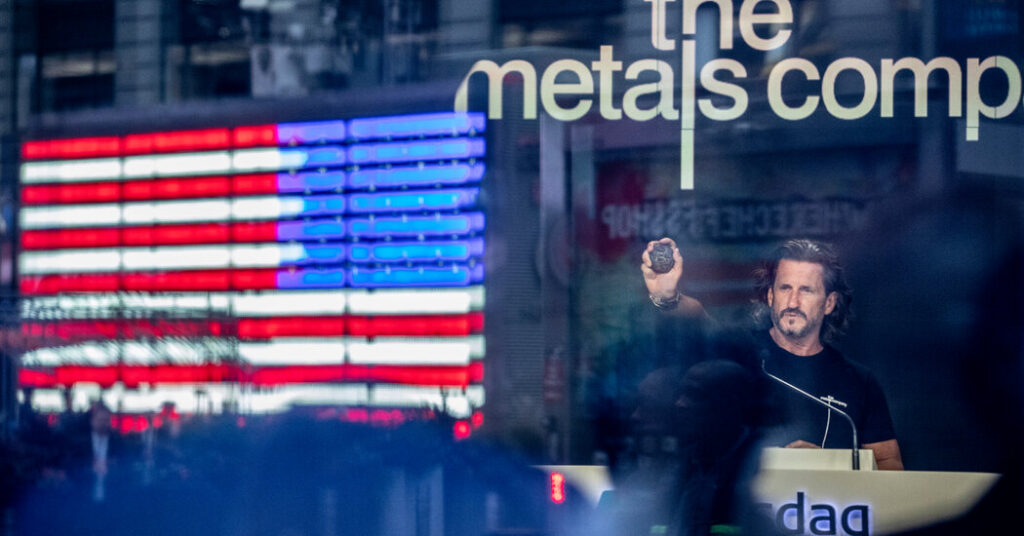Less than a week after President Trump signed an executive order to accelerate seabed mining, the U.S. government received its first permit application from the Metals Company, one of the most ardent proponents of the as yet unproven practice.
On Tuesday, the company’s chief executive, Gerard Barron, was also on hand in Washington, D.C., for a contentious hearing in front of Congress’s natural resources committee. He likened Mr. Trump’s move to a “starting gun” in the race to extract minerals like cobalt and nickel from potato-size nodules lying in the frigid, pitch-black, two-and-a-half-mile-deep sands of the Pacific Ocean floor.
Republican and Democratic committee members clashed over how much weight should be given to environmental concerns about the practice. The Trump administration has said it will consider issuing permits for mining in territorial U.S. waters and also in international waters.
Other countries have condemned the United States for essentially circumventing international law by saying it would permit seabed mining in waters that nearly every other country considers to be governed by the International Seabed Authority, an independent organization.
No commercial-scale seabed mining has ever taken place.
Representative Jared Huffman of California who is also the committee’s ranking Democrat, said the Metals Company and Mr. Trump were moving seabed mining forward in a “reckless cowboy manner.” He and other Democrats questioned the business case for mining cobalt and nickel given that electric-vehicle manufacturers, once major buyers of the metals, were moving toward batteries that didn’t use them.
“The industry’s financial models are based on wildly optimistic assumptions and fail to reflect the volatility and reality of global mineral markets,” said Representative Maxine E. Dexter, Democrat of Oregon.
The Metals Company sought to assure the committee that any damage to the seafloor would be far outweighed by potential job creation and access to minerals whose supply chains are currently dominated by China. The company says it has conducted a decade of expensive environmental studies that support its conclusions.
Mr. Trump’s order came after years of delays at the International Seabed Authority in setting up a regulatory framework for seabed mining. The authority, created decades ago under the auspices of the United Nations, is likely to miss another deadline this year to codify those rules.
“It took 14 years just to begin drafting a mining code,” Mr. Barron told the committee, calling it “a deliberate strategy” to slow seabed mining.
He also said a polymetallic nodule extracted by his company was presented to Mr. Trump recently, and he claimed it now sat on the president’s desk in the Oval Office.
The U.S. Geological Survey has estimated that nodules in a single swath of the Eastern Pacific, known as the Clarion-Clipperton Zone, contain more nickel, cobalt and manganese than all terrestrial reserves combined. That area, where the Metals Company is proposing to mine, is in the open ocean between Mexico and Hawaii and covers an area about half the size of the continental United States.
The committee’s chairman, Representative Paul Gosar, Republican of Arizona, said seabed mining was needed to get the United States out from under the “supply chain yoke” of China, which currently processes a majority of the world’s cobalt, much of its nickel and many other critical minerals, which include so-called rare earths.
China recently imposed export restrictions on some rare-earth elements, leading to fears that American companies using them to make an array of advanced electronics would face shortages.
The House committee also heard from Thomas Peacock, a professor of mechanical engineering at the Massachusetts Institute of Technology, who has taken part in studies of seabed mining’s effects on the seafloor, some of which were funded in part by the Metals Company.
Dr. Peacock said that while there were potentially hundreds of unknown species in the Clarion-Clipperton Zone and that specific areas deserved to be cordoned off from mining, “research indicates that some of the proposed impacts of nodule mining may not be as severe as speculated.”
In particular, he downplayed the risks that mining could cause plumes of sand and debris that could affect life on the seafloor as well as higher in the open ocean where fish like tuna live and feed. The debris would be “roughly the equivalent of a grain of sand in a fishbowl,” Dr. Peacock said.
Sitting next to Mr. Barron was the chief executive of another prospective deep-sea miner, Impossible Metals. Unlike the Metals Company, which has extraction technology that resembles a vacuum attached to an autonomous vehicle that would trundle across the seafloor, sending up nodules to a ship through a pipe, Impossible Metals says it has a machine that will pick up nodules individually and without actually landing on the seafloor.
“Our underwater robots hover to collect the mineral-rich nodules from the seabed through an A.I.-driven selective harvesting,” Oliver Gunasekara, the chief executive of Impossible Metals, said. “We pick up nodules individually avoiding all visible life, leaving 60 percent untouched.”
The company has reapplied for an exploration permit off American Samoa in U.S. territorial waters. Mr. Gunasekara said that while an earlier application had been denied under the Biden administration, both American Samoa and Washington were under new leadership and he was confident of its approval.




